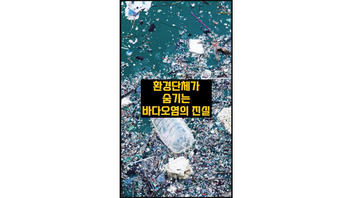
Do environmental nongovernmental organizations (NGOs) hide the fishnet problem in favor of the fishing industry? No, that's not true: Seventy to 80 percent of plastic marine waste is transported by river from the land, according to two scientific studies.
The claim reappeared as a video (archived here) where it was published by @1minute_jisik on TikTok on March 7, 2023, under the title "환경단체가 숨기는 바다 오염의 진실" ("The truth of marine contamination that Environmental NGOs are hiding," as translated by Lead Stories staff). It opened:
Half of the marine waste, and the majority of marine plastic is not domestic waste, it is fishnet.
This is what the post looked like on TikTok at the time of the writing of this fact check:
(Source: TikTok screenshot taken on Fri Apr 28 04:47:55 2023 UTC)
The main claim appeared in the Netflix documentary "Seaspiracy." However, the video on TikTok also claims that environmental NGOs are deliberately hiding the truth since they are financially supported by industrial fishers.
In fact, most of the plastic in our oceans comes from land-based sources: by weight, 70 to 80 percent is plastic that is transported from land to the sea via rivers or coastlines, according to a 2018 study published in Scientific Reports, an open-access journal, and a 2016 study published by Science of the Total Environment, another scientific journal. The other 20 to 30 percent comes from marine sources such as fishing nets, lines, ropes and abandoned vessels. Even though, by Greenpeace's estimate, 640,000 tonnes of fishing gear are lost or abandoned in the oceans every year, this amount only makes up around 10 percent of the plastic in the oceans, the UN's Food and Agriculture Organization reports.
Are environmental NGOs funded by fisheries trying to hide the issue? NGOs may have connections with fisheries, but the reality is not as simple as conspiracy theories suggest. NGOs are neither mere defenders of fishers, nor enemies of fishers. NGOs unite with small fishers to stop destructive fishing and consult with small fishers to protect the biodiverse ocean.














